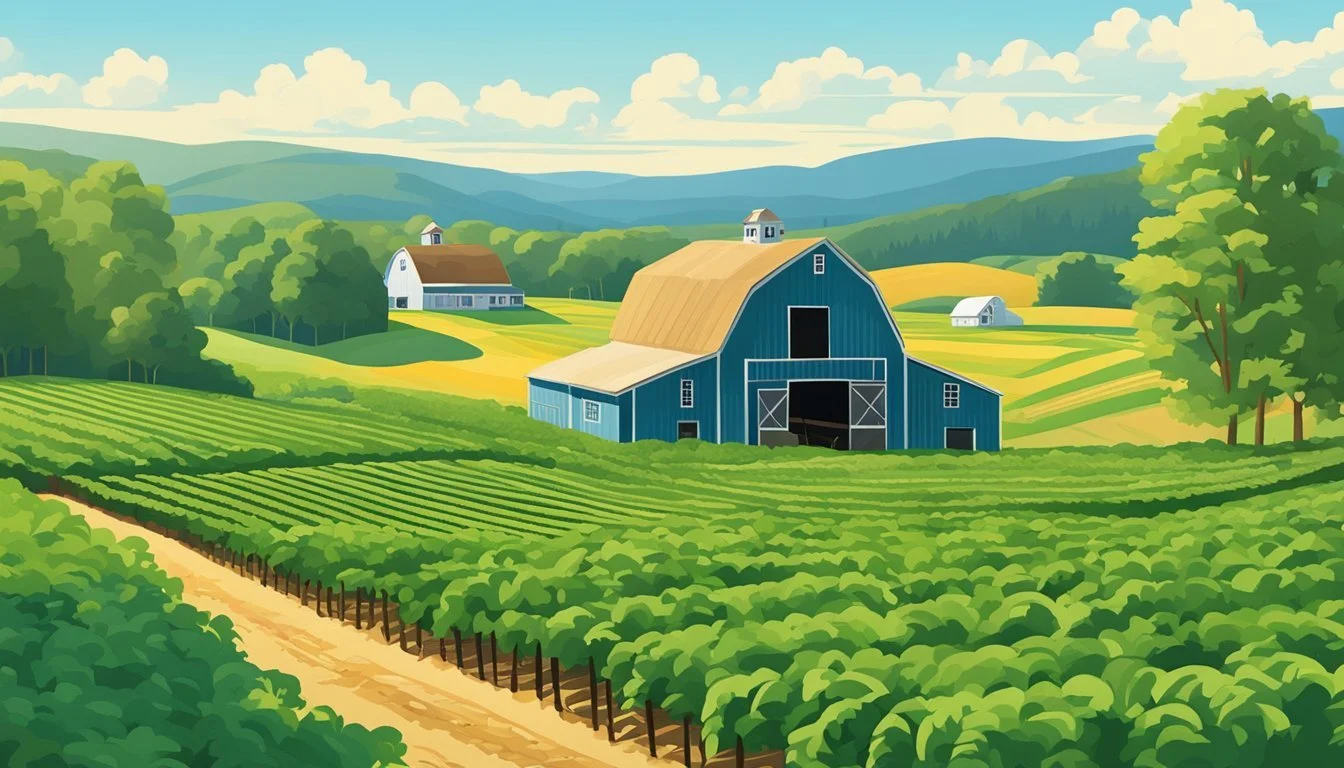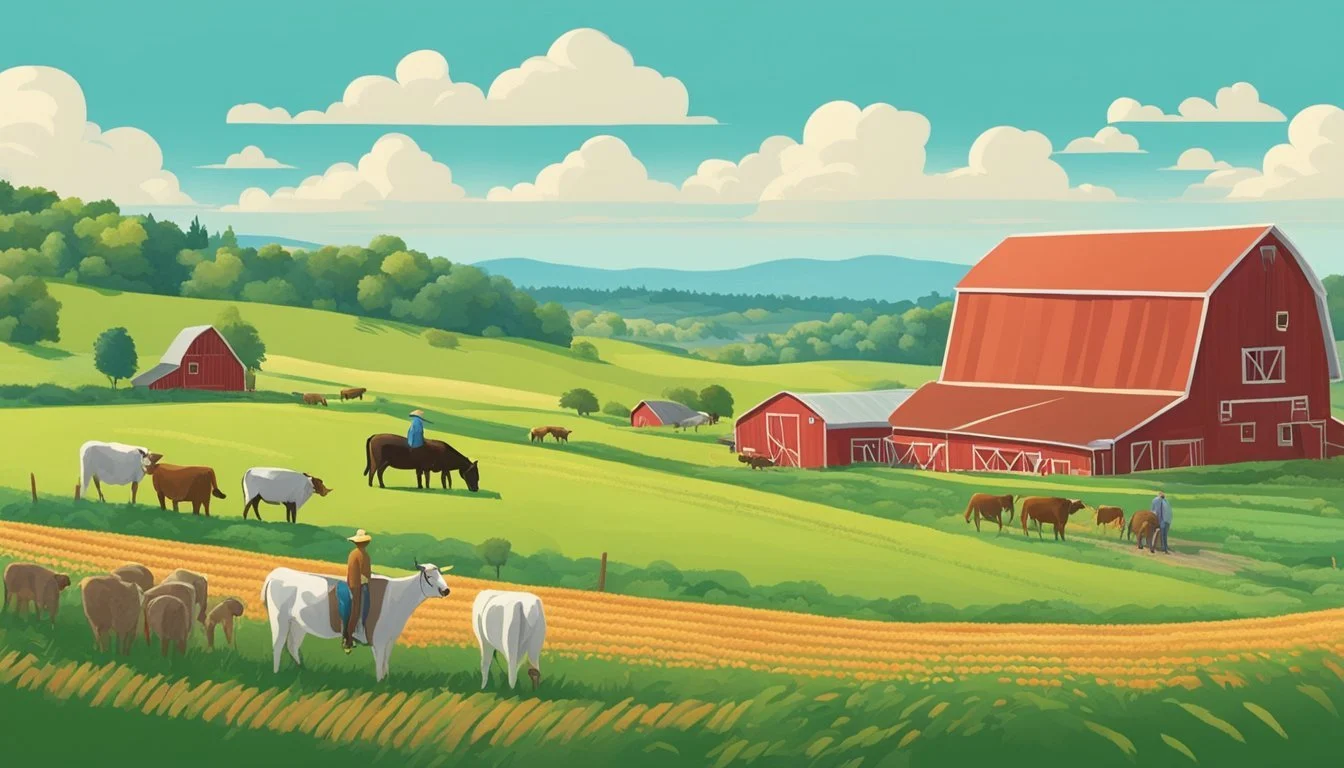Guide to Farming in New Hampshire
Essentials for Successful Agriculture
This Article is Part of Our State by State Farming Guide
Agriculture in New Hampshire encompasses a diverse range of practices and techniques tailored to the state's unique climate and terrain. With a landscape that offers a mixture of valleys, mountains, and a short stretch of Atlantic coast, the state offers various opportunities for farming, from traditional dairy farms and apple orchards to emerging sectors like organic produce and specialty foods. Farmers in the region navigate through a matrix of state and federal regulations, finding ways to optimize land use, maintain animal health, and manage labor and taxes effectively. The state provides comprehensive resources to help agriculturists understand these regulations and apply best practices in their operations.
New Hampshire's agricultural producers are provided with ample support through guides and fact sheets, which are not specific to any single enterprise but cover a breadth of topics essential for running a farm business. These resources cover soil conservation, water quality, food safety, and value-added production, ensuring that farmers are well-equipped to address the various aspects of their business. Whether one is a new entrant to farming or an experienced producer looking to innovate, the state's extension programs and the Department of Agriculture, Markets, and Food offer structured guidance for both.
Advancements in the agricultural sector, including agritourism and the promotion of local produce, are integral to New Hampshire's farming landscape. In addition to production-focused advice, farmers are encouraged to explore novel avenues such as agritourism to diversify income and connect with the community. This holistic approach to agricultural guidance reflects New Hampshire's commitment to nurturing a robust and sustainable farming industry that can adapt to evolving market demands and environmental considerations.
Understanding New Hampshire's Agricultural Landscape
New Hampshire's diverse topography and climate create a unique agricultural environment, where small-scale farms provide a variety of crops and livestock to local markets. The commitment to sustainable practices is evident in the state's farming methodology.
Climate and Geography
New Hampshire exhibits a varied climate, with cold, snowy winters and warm, humid summers. These conditions heavily influence the agricultural activities within the state. Its topography ranges from the low-lying seacoast to the rugged White Mountains, which means soil types and growing conditions can vary significantly within short distances. This diversity allows for multiple types of farming to occur, from high tunnel production to traditional outdoor cultivation.
Average Temperature Range:
Summer: 70-85°F (21-29°C)
Winter: 15-35°F (-9 to 1°C)
Precipitation: Varies across regions, with higher levels in mountainous areas.
Key Crops and Livestock
Crops in New Hampshire are suited to its short growing season, with hearty vegetables like squash and potatoes thriving in this climate. The state is also known for its fruit production, particularly apples from its orchards. New Hampshire's tree fruit crops involve both conventional orchards and high tunnel systems that extend the growing season and protect from harsh weather.
Major Crops:
Vegetables (such as squash, pumpkins, and potatoes)
Apples
Livestock farming is less prominent but still vital, with dairy farms and cattle ranches dotting the landscape, providing milk, beef, and other animal products to local and regional markets.
Livestock Includes:
Dairy Cows
Beef Cattle
Local Farmers and Markets
Local farmers in New Hampshire often sell their products directly to consumers through farmers' markets or on-site farm stores. These farmers' markets are not just places of commerce but also community hubs where relationships between growers and consumers strengthen. Many New Hampshire farms are small to medium in size, with a focus on diversity and sustainability, and they play a crucial role in maintaining the state's scenic vistas as well as its agricultural economy.
Notable Points:
Direct consumer sales are a significant aspect of local agriculture.
Farms commonly range from 30-300 acres in size.
Most farms contribute to the preservation of New Hampshire's natural beauty, offering picturesque landscapes that include open fields and pastures. This puts a spotlight on agricultural stewardship and the value of maintaining land for farming purposes.
Starting a Farm in New Hampshire
When embarking on the journey of starting a farm in New Hampshire, prospective farmers need to consider location, create a detailed business plan, and navigate the process of acquiring land and capital effectively.
Choosing a Farm Location
The first critical step for farmers is selecting an appropriate location. Towns and cities in New Hampshire offer diverse agricultural opportunities, each with unique resources such as soil types, climate, and proximity to markets. Prioritizing soil testing and assessing the accessibility of water resources at a potential site can significantly influence the success of the farm business.
Business Planning and Registration
Every farm business must begin with a comprehensive business plan. This plan should outline the farm’s goals, projected cash flow, and strategies for marketing and operations. Registration of the business with the state of New Hampshire is also essential. The New Hampshire Farm Bureau Federation offers resources for developing a business plan and navigating the registration process.
Acquiring Land and Capital
Obtaining the necessary land and capital to start a farm can be achieved through purchase, lease, or working with land trusts. It is crucial for farmers to have a thorough enterprise budget and understand the financial resources available to them, including loans and grants. Farmers can explore the New Hampshire Farm Directory to research available farming sites and the "Who’s Who in New Hampshire Agriculture" to connect with potential financial supporters and experts.
Farm Management Practices
Effective farm management practices are crucial for the sustainability, productivity, and economic viability of farming in New Hampshire. They encompass a range of activities from soil preservation to animal welfare, each contributing to a farm's success and the conservation of resources.
Soil Health and Crop Rotation
Soil Health is the foundation of productive farming. Farmers are advised to regularly test soil for nutrients and pH levels to maintain optimal growing conditions. Crop rotation plays a significant role; by alternating crops seasonally, farmers can prevent soil depletion, curb pest infestations, and reduce the spread of disease.
Crop Types: Consider rotating legumes with cereals or other crops.
Soil Testing: Conduct bi-annual or annual testing for informed amendments.
Animal Husbandry and Welfare
Ensuring Animal Welfare is a key aspect of farm management. Suitable housing, sufficient space, and appropriate feeding are essential for the health and productivity of livestock. New Hampshire's guidelines for livestock recommend specific space allocations and waste management protocols.
Space Guidelines: Refer to the Best Management Practices for space per animal.
Feeding Regimes: Use quality feeds and clean water to promote animal health.
Sustainable Agriculture and Conservation
Conservation efforts in farming aim to protect the environment while maintaining a farm's economic viability. Practices such as minimizing chemical use, managing animal waste, and preserving water quality are integral to sustainable agriculture. Resources are available to support farms in these endeavors, ensuring a balance between productivity and environmental stewardship.
Chemical Use: Employ integrated pest management to reduce reliance on chemicals.
Water Conservation: Implement rainwater harvesting and drip irrigation systems.
Sales and Marketing Strategies
Effective sales and marketing strategies are essential for New Hampshire farmers to connect with their market and enhance their profit margins. This section will explore how farmers can understand their customers, create a strong brand, and diversify their sales channels.
Understanding Your Market
Knowing the target consumers and their preferences is the first step in creating successful sales strategies. Farmers must research consumer trends and local demands to ensure that their product offerings align with what the market seeks. This involves analyzing market data, attending industry workshops, and possibly collaborating with the New Hampshire Farm Bureau Federation to gain insights into market types and consumer behavior.
Branding and Marketing Your Products
Developing a compelling brand identity is crucial for standing out in the marketplace. The branding should reflect the unique qualities of the farm and its products. This can include a distinctive logo, packaging, and consistent messaging across all marketing materials. Effective marketing channels such as social media, email newsletters, and agricultural fairs should be utilized to reach potential customers. Storytelling can also be a powerful marketing tool, allowing farms to connect with consumers on a personal level.
Diversifying Sales Channels
Diversification of sales channels can reduce risk and increase revenue. Farmers in New Hampshire have several options:
Farm Stands: Direct sales to consumers at the roadside or on the farm.
Farmers' Markets: Regularly occurring markets where multiple sellers convene.
Community Supported Agriculture (CSA): Subscription-based services where consumers receive regular produce deliveries.
Pick-Your-Own: An operation where consumers harvest produce themselves.
Each of these avenues offers different benefits and may appeal to different segments of the market. Farmers should consider their own resource availability and business goals when selecting the channels that best fit their operation.
Agricultural Resources and Support
New Hampshire farmers have access to a robust network of resources and support. These aids range from the NH Department of Agriculture’s services to financial and educational programs designed to bolster the state's agricultural economy, mental health, and community connectivity.
NH Department of Agriculture Services
The NH Department of Agriculture, Markets and Food (NH DAMF) provides vital support to the state's agricultural producers. Services include disaster resources for events such as flooding, and the Produce Safety Program team is available for consultations regarding crop health after such events. Contact can be made through their provided email or by phone.
Financial and Educational Support
Free Mediation Services: Available through the New Hampshire Agricultural Mediation Program, addressing COVID-19 issues and other agricultural disputes (contact: 603-685-4780).
Legal Guidance for Agricultural Producers: Covering critical topics like Labor and Employment Law to ensure compliance with various regulations.
Economic Impact: Agriculture's total economic contribution is substantial, with significant spending and job creation that includes indirect and induced effects.
Networking and Community Events
NH Farm Network: A collaboration of service providers that offers assistance to established and aspiring farms as well as farm workers in New Hampshire.
Knowledge Sharing: They host events and create settings for farmers to exchange knowledge, and address farming challenges in the region.
By tapping into these resources and networks, farmers in New Hampshire can navigate the complexities of agricultural operations with confidence and support.
Diversification and Specialty Farming
In New Hampshire, diversification and specialty farming offer avenues to enhance the economic stability of farms. Farmers adopt various strategies, from greenhouse and nursery production to organic crop cultivation and developing value-added products.
Greenhouse and Nursery Production
Greenhouses provide farmers with the ability to extend growing seasons and control environmental conditions, allowing for a steady production of plants year-round. Nursery operations focus on cultivating trees, shrubs, and perennial plants, which cater to the landscaping needs within the region. Both greenhouse and nursery production are integral components of New Hampshire's agricultural sector due to the state's diverse climate.
Greenhouse Advantages:
Extended growing seasons
Controlled environments
Key Nursery Products:
Ornamental trees
Shrubs and perennials
Organic and Specialty Crop Cultivation
Organic farming in New Hampshire respects the natural limitations and cycles of the environment, leading to the production of high-quality specialty crops such as fruits, vegetables, and herbs. These specialty crops are increasingly in demand, contributing not only to local food systems but also reaching broader markets, as consumers seek out healthier, sustainably grown options.
Specialty Crops Include:
Fruits and vegetables
Herbs and honey
Organic Farming Practices:
No use of synthetic pesticides
Crop rotation and natural fertilizers
Value-Added Products and Agritourism
Farmers are creating value-added products, such as cheeses, jams, and maple syrup, which enhance farm profitability by offering unique items that highlight New Hampshire's agricultural heritage. Agritourism is another growing sector, inviting visitors to experience farming firsthand through activities like u-pick orchards, farm stays, and educational tours.
Examples of Value-Added Products:
Handcrafted cheeses
Artisanal bread and preserves
Agritourism Activities:
Apple picking
Farm tours and workshops
Technology and Innovation in Agriculture
In the realm of New Hampshire farming, embracing technology and innovation is the linchpin for enhancing productivity and sustainability. Farmers are investing in modern equipment and software solutions to optimize their operations.
Modern Farming Equipment
The utilization of advanced farming equipment is a game-changer for agricultural productivity. New Hampshire farmers deploy precision agriculture tools such as GPS-guided tractors and drones to monitor crop health and apply inputs like fertilizers and pesticides with remarkable accuracy. These innovations reduce waste, increase yield, and are integral to environmentally responsible farming practices.
Key features of modern farming equipment include:
Automated systems: Machines that can be programmed to perform tasks with minimal human intervention.
Sensors: Devices that collect data on soil conditions, crop health, and weather patterns to inform decision-making.
Software and Farm Management Systems
To streamline farm operations, farmers utilize specialized software and farm management systems. These systems serve as a digital backbone, offering comprehensive solutions for record-keeping, resource management, and strategic planning.
Key components of these systems include:
Operating Systems: Robust platforms that ensure seamless integration of various software applications tailored for agricultural needs.
Data Analytics: Tools that analyze large datasets to provide actionable insights on farm productivity and resource usage.
Mobile Accessibility: Features that allow farmers to access critical information and manage their operations remotely.
By employing these technological advancements, New Hampshire farmers are positioning themselves at the forefront of efficient and sustainable agriculture.
Regulatory Compliance and Food Safety
Farmers in New Hampshire must adhere to federal and state regulations designed to ensure that consumers receive safe and high-quality agricultural products. These regulations also serve to protect the health of the public and maintain the integrity of the farming business.
Licensing and Inspections
Farmers must obtain the appropriate licenses prior to engaging in the sale of food products. The New Hampshire Department of Health and Human Services oversees the licensing process and conducts regular inspections to ensure compliance with health and safety standards. On the federal level, the Food Safety Modernization Act (FSMA) mandates that farms growing fruits and vegetables which may be consumed raw comply with specific preventive practices to reduce the risk of microbial contamination.
Licenses Required:
Food Service License
Agricultural Commodities License
Inspection Focus Areas:
Sanitation processes
Employee hygiene
Equipment cleanliness
Product Quality and Safety Standards
The Division of Regulatory Services in New Hampshire enforces laws and rules concerning the marketing of agricultural commodities such as feed, fertilizer, liming materials, horticultural growing media, and seed. Strict safety standards are in place to prevent the contamination of fresh produce, safeguarding consumer health and ensuring product quality.
Standards to Meet:
Microbial testing of products
Compliance with fertilizer and pesticide regulations
Implementation of preventive controls
Farmers' adherence to these regulatory standards is vital for the economy by instilling consumer confidence in the agricultural market and for safeguarding public health.
Success Stories and Case Studies
New Hampshire’s farming landscape is punctuated by inspiring examples of agricultural innovation and regenerative practices. This section showcases how individual farms and educational institutions have cultivated notable success through resilience and adopting best practices.
Innovative Farms in New Hampshire
One such story comes from Mike Madden, the energetic owner of Scooter's Farm in Woodmont. His journey underscores the integration of conservation with agricultural productivity. He focuses on supporting native pollinators and minimizing pesticide use, showcasing a commitment to environmental stewardship and sustainable farming practices.
Another example is the University of New Hampshire's Food Production Field Experience course, a hands-on learning experience initiated in the fall of 2012. It not only represents the university's investment in the future of farming but also underlines the importance of merging educational curricula with real-world agricultural applications, strengthening the knowledge base for future generations.
Lessons Learned and Best Practices
The New Hampshire Farm Viability Task Force Report points out that farming in the state is a blend of land use and business. Farms like Blue Heron Farm are beacons illustrating the application of such insights. Emma Downing leveraged the knowledge she garnered, such as environmental benefits and scenic beauty contributions, to foster a farming model that is both aesthetically pleasing and operationally viable.
Through Annie's Project, women in agriculture receive empowerment and mentorship, highlighting the social dimension of farming enterprises and their impact on community building.
Key Practices for Success:
Embrace environmental stewardship.
Integrate educational programs with farming.
Foster community involvement and female empowerment in agriculture.
These narratives not only weave the story of agriculture's potential but also educate on the integral connection between the land, business, and community in New Hampshire's farming success.









